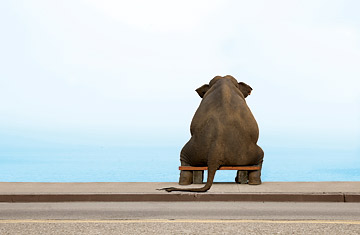
(5 of 6)
His party could be too. Hispanics, Asians and blacks are on track to be the majority in three decades; metropolitan voters and young voters who skew Democratic are also on the rise. This is why Rogers recently decided to quit being a talking head: "I had a meeting with myself, and I said, Do we really need more white lobbyists with gray hair on TV?" But it's not clear that more diverse spokesmen or better tweets can woo a new generation to the GOP; support for gay rights is soaring, and polls show that voters prefer Democratic approaches to health care, education and the economy. "The outlook for Republicans is even worse than people think," says Ruy Teixeira, author of The Emerging Democratic Majority. "Their biggest problem is that they really believe what they believe."
So Republicans need to decide what Republicans need to believe. What does their three-legged stool of strong defense, traditional values and economic conservatism mean today? Does strong defense mean unqualified support for torture, outdated weapons systems and pre-emptive wars? Do traditional values mean no room in the tent for pro-choicers like Specter and Snowe? Even Joe the Plumber--who opposes abortion and homosexuality and considers America a "Christian nation"--wants the party to drop its "holier than thou" attitude on divisive social issues.
The most urgent question is the meaning of economic conservatism. Representative Patrick McHenry of North Carolina, a conservative who keeps a bust of Reagan on his desk, surprised me by declaring that the Reagan era is over. "Marginal tax rates are the lowest they've been in generations, and all we can talk about is tax cuts," he said. "The people's desires have changed, but we're still stuck in our old issue set." Snowe recalls that when she proposed fiscally conservative "triggers" to limit Bush's tax cuts in case of deficits, she was attacked by fellow Republicans. "I don't know when willy-nilly tax cuts became the essence of who we are," she says. "To the average American who's struggling, we're in some other stratosphere. We're the party of Big Business and Big Oil and the rich." In the Bush era, the party routinely sided with corporate lobbyists--promoting tax breaks, subsidies and earmarks for well-wired industries--against ordinary taxpayers as well as basic principles of fiscal restraint. South Carolina Senator Jim DeMint's Republican alternative to the stimulus included tax cuts skewed toward the wealthy; at this point, the GOP's reflexes are almost involuntary.
Now that they've lost their monopoly on power, many Republicans are warning that spending-fueled deficits will cause inflation, reduce demand for U.S. Treasuries and shaft future generations. They don't seem so worried about an imminent depression, which would explode deficits in addition to the shorter-term pain, and their newfound fear of borrowing has not cooled their ardor for budget-busting tax cuts. "They talk about fiscal restraint, but they've got an atrocious record, and they've still got atrocious plans," says Robert Bixby, executive director of the nonpartisan Concord Coalition.
